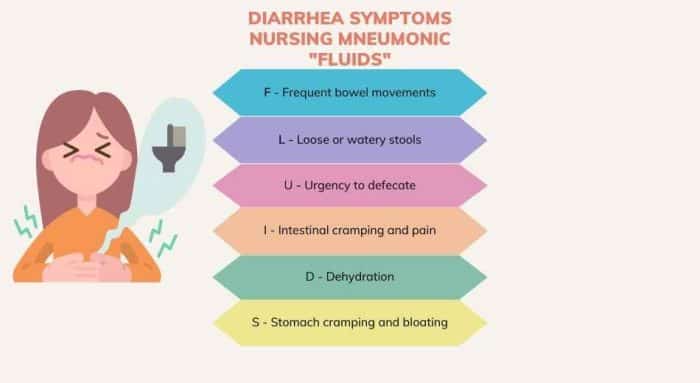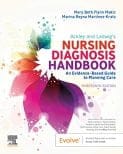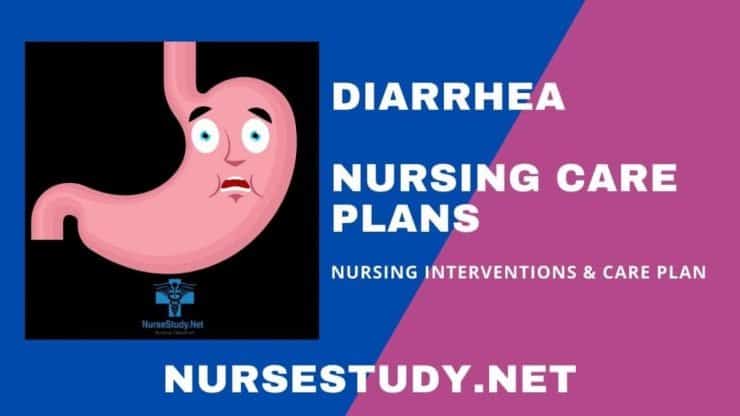Last updated on May 14th, 2024 at 12:05 am
Definition of Diarrhea: Diarrhea is defined as the passage of loose or watery stools three or more times within a 24-hour period. It is a common symptom that can be caused by various factors such as infections, food intolerances, medication side effects, and underlying health conditions.
Defining Characteristics of Diarrhea
Subjective
- Reports of increased frequency and urgency of bowel movements.
- Complaints of loose or watery stools.
- Abdominal cramping or discomfort.
- Feelings of nausea or vomiting.
Objective
- Frequent and loose/watery stools documented in the medical record.
- Presence of mucus or blood in the stools.
- Signs of dehydration, such as dry mouth, decreased urine output, or low blood pressure.
- Abdominal tenderness or distension.
- Increased bowel sounds.

Related Factors
- Infection: Viral, bacterial, or parasitic gastrointestinal infections.
- Medications: Antibiotics, laxatives, certain antacids, or chemotherapy drugs.
- Food intolerances: Lactose intolerance or sensitivity to certain food additives.
- Inflammatory bowel disease: Crohn’s disease or ulcerative colitis.
- Irritable bowel syndrome (IBS).
- Stress or anxiety.
- Malabsorption disorders: Celiac disease or pancreatic insufficiency.
- Radiation therapy.
Risk Population
- Individuals with compromised immune systems, such as those with HIV/AIDS or undergoing chemotherapy.
- Elderly individuals.
- Travelers to regions with poor sanitation.
- Individuals with chronic health conditions affecting the gastrointestinal system.
Associated Problems
- Dehydration and electrolyte imbalances.
- Malnutrition and weight loss.
- Skin breakdown due to frequent stool contact.
- Impaired self-care and hygiene.
- Anxiety and discomfort.
- Infection transmission to others.
Suggestions for Use
When assessing a patient with diarrhea, it is important to gather subjective information regarding the frequency and characteristics of bowel movements, associated symptoms, and any potential triggers or recent changes in medication or diet. Objective assessment should focus on monitoring stool characteristics, signs of dehydration, abdominal assessment, and overall patient comfort.

Suggested Alternative NANDA Diagnoses:
- Risk for Imbalanced Fluid Volume related to diarrhea.
- Risk for Impaired Skin Integrity related to frequent stool contact.
- Imbalanced Nutrition: Less than Body Requirements related to malabsorption.
- Acute Pain related to abdominal cramping and discomfort.
- Anxiety related to the unpredictable nature of diarrhea and its impact on daily activities.
Usage Tips:
- Diarrhea nursing diagnosis should be individualized based on the patient’s specific symptoms, history, and potential contributing factors.
- Regular monitoring of bowel movements, hydration status, and electrolyte levels is essential.
- Provide education to the patient and family regarding dietary modifications, proper hand hygiene, and infection prevention strategies.
- Collaborate with other healthcare professionals, such as dieticians or infectious disease specialists, as necessary.
- Document the effectiveness of interventions and changes in the patient’s condition over time.
NOC Outcomes:
- Fluid and Electrolyte Balance.
- Skin Integrity.
- Nutritional Status.
- Pain Control.
- Anxiety Control.
- Knowledge: Medication Management.
NOC Results:
- Demonstrates stable fluid and electrolyte balance.
- Maintains intact skin without signs of breakdown.
- Achieves or maintains appropriate nutritional status.
- Reports reduced or controlled pain.
- Exhibits reduced anxiety related to diarrhea.
- Demonstrates understanding of medication management and infection prevention strategies.
NIC Interventions:
- Fluid and Electrolyte Management:
- Assess fluid balance and electrolyte levels regularly.
- Administer oral rehydration solutions or intravenous fluids as prescribed.
- Monitor intake and output, and encourage increased fluid intake.
- Educate the patient about signs and symptoms of dehydration and the importance of fluid replacement.
- Bowel Management:
- Monitor and record the frequency, consistency, and characteristics of bowel movements.
- Encourage the patient to maintain a regular bowel routine and respond promptly to the urge to defecate.
- Administer prescribed antidiarrheal medications or other bowel regulators as ordered.
- Provide education on dietary modifications, such as a low-fiber or bland diet, to help control diarrhea.
- Skin Care:
- Assess the perineal area for signs of irritation or breakdown.
- Cleanse the perineal area gently with mild soap and water after each bowel movement.
- Apply a protective barrier cream or ointment to prevent skin breakdown.
- Teach the patient and caregivers proper perineal hygiene techniques.
- Pain Management:
- Assess the patient’s pain level using a pain scale.
- Administer prescribed analgesics or antispasmodic medications to relieve abdominal cramping and discomfort.
- Apply heat packs or provide relaxation techniques to alleviate pain.
- Encourage the patient to rest in a comfortable position to minimize pain and discomfort.
- Education and Support:
- Provide education on hand hygiene practices to prevent the spread of infection.
- Teach the patient and family about dietary modifications, including foods to avoid and those that may help control diarrhea.
- Offer emotional support and reassurance, addressing any anxiety or concerns related to diarrhea.
- Encourage the patient to maintain a symptom diary to track patterns and triggers of diarrhea.
Nursing Care Plan for Diarrhea 1
Fluid Volume Deficit
Nursing Diagnosis: Risk for Fluid Volume Deficit related to excessive fluid loss through diarrhea, as evidenced by dehydration, decreased urine output, dry mucous membranes, and altered mental status.
Goals:
- Maintain adequate fluid and electrolyte balance.
- Promote normal bowel function and reduce frequency of diarrhea.
- Prevent skin breakdown and maintain skin integrity.
- Alleviate discomfort and manage abdominal pain.
- Provide education and support to the patient and family.
Nursing Interventions for diarrhea:
- Monitor vital signs, intake, and output.
- Administer oral rehydration solutions or intravenous fluids as prescribed.
- Encourage small, frequent fluid intake.
- Administer prescribed antidiarrheal medications as ordered.
- Promote a regular bowel routine and respond promptly to the urge to defecate.
- Assess and manage perineal hygiene.
- Apply protective barrier cream to the perineal area.
- Administer prescribed analgesics or antispasmodic medications for pain relief.
- Provide education on hand hygiene practices and infection prevention.
- Educate the patient and family on dietary modifications and fluid replacement strategies.
Nursing Care Plan for Diarrhea 2:
Risk for Imbalanced Nutrition: Less than Body Requirements
Nursing Diagnosis: Risk for Imbalanced Nutrition: Less than Body Requirements related to excessive fluid loss through diarrhea, as evidenced by decreased appetite, weight loss, and altered bowel habits.
Goals:
- Achieve and maintain adequate nutritional status.
- Identify and address factors contributing to malabsorption.
- Educate the patient on dietary modifications to improve absorption and control diarrhea.
- Monitor weight and nutritional markers.
Nursing Intervention for diarrhea:
- Assess the patient’s nutritional status, including weight, BMI, and serum albumin levels.
- Collaborate with a dietician to develop an individualized dietary plan.
- Encourage the consumption of small, frequent meals rich in easily digestible foods.
- Provide education on foods to avoid and those that may help control diarrhea.
- Monitor and record dietary intake and bowel movements.
- Administer prescribed vitamin and mineral supplements as needed.
- Evaluate the patient’s response to dietary modifications and adjust the plan accordingly.
Diarrhea Nursing Practice Questions:
Question 1: A nursing student is caring for a patient with diarrhea. Which of the following is the priority nursing intervention?
A. Administering antidiarrheal medication as ordered.
B. Assessing the patient’s hydration status.
C. Providing perineal care after each bowel movement.
D. Educating the patient on dietary modifications.
Answer: B. Assessing the patient’s hydration status.
Rationale: Assessing the patient’s hydration status is the priority intervention in a patient with diarrhea. Diarrhea can lead to fluid and electrolyte imbalances, so monitoring the patient’s hydration status is crucial to prevent complications such as dehydration.
Question 2: The nurse is educating a patient with diarrhea about dietary modifications. Which of the following statements by the patient indicates understanding of the teaching?
A. “I will increase my intake of high-fiber foods.”
B. “I should avoid dairy products for now.”
C. “I can eat spicy foods to help control my diarrhea.”
D. “I will drink carbonated beverages to stay hydrated.”
Answer: B. “I should avoid dairy products for now.”
Rationale: Avoiding dairy products is appropriate for a patient with diarrhea as lactose intolerance can exacerbate symptoms. Dairy products should be temporarily avoided until the underlying cause of the diarrhea is resolved.
Question 3: The nurse is assessing a patient with diarrhea and notes dry mucous membranes, decreased urine output, and hypotension. These findings are indicative of:
A. Dehydration.
B. Electrolyte imbalance.
C. Malabsorption.
D. Infection.
Answer: A. Dehydration.
Rationale: Dry mucous membranes, decreased urine output, and hypotension are signs of dehydration. Diarrhea can lead to excessive fluid loss, and these findings indicate inadequate fluid intake or fluid replacement.
Question 4: A patient with diarrhea is prescribed an antidiarrheal medication. Before administering the medication, the nurse should assess the patient for:
A. Abdominal pain.
B. Increased bowel sounds.
C. Fever.
D. Hypertension.
Answer: A. Abdominal pain.
Rationale: Assessing for abdominal pain is important before administering antidiarrheal medication because these medications can cause constipation and worsen abdominal pain in certain conditions such as inflammatory bowel disease.
Question 5: The nurse is providing education to a patient with diarrhea about infection prevention. Which statement by the patient indicates a need for further teaching?
A. “I will wash my hands thoroughly after using the bathroom.”
B. “I will dispose of soiled tissues in a plastic bag.”
C. “I will avoid close contact with others until my symptoms improve.”
D. “I will use a separate bathroom if possible to prevent spreading the infection.”
Answer: B. “I will dispose of soiled tissues in a plastic bag.”
Rationale: Soiled tissues should be disposed of in a designated container with a lid, not a plastic bag, to prevent the spread of infection. Using a plastic bag can potentially allow the spread of pathogens and contaminate the environment.
Nursing References
Ackley, B. J., Ladwig, G. B., Makic, M. B., Martinez-Kratz, M. R., & Zanotti, M. (2020). Nursing diagnoses handbook: An evidence-based guide to planning care. St. Louis, MO: Elsevier.
Gulanick, M., & Myers, J. L. (2022). Nursing care plans: Diagnoses, interventions, & outcomes. St. Louis, MO: Elsevier.
Ignatavicius, D. D., Workman, M. L., Rebar, C. R., & Heimgartner, N. M. (2020). Medical-surgical nursing: Concepts for interprofessional collaborative care. St. Louis, MO: Elsevier.
Silvestri, L. A. (2020). Saunders comprehensive review for the NCLEX-RN examination. St. Louis, MO: Elsevier.
Best Nursing Books and Resources
These are the nursing books and resources that we recommend.
NurseStudy.net is a participant in the Amazon Services LLC Associates Program. Included below are affiliate links from Amazon at no additional cost from you. We may earn a small commission from your purchase. Please see our Privacy Policy

The Nursing Diagnosis Handbook E-Book: An Evidence-Based Guide to Planning Care
This is an excellent reference for nurses and nursing students. While it is a great resource for writing nursing care plans and nursing diagnoses, it also helps guide the nurse to match the nursing diagnosis to the patient assessment and diagnosis.
This handbook has been updated with NANDA-I approved Nursing Diagnoses that incorporates NOC and NIC taxonomies and evidenced based nursing interventions and much more.

NANDA International Nursing Diagnoses: Definitions & Classification, 2021-2023
All introductory chapters in this updated version of a ground-breaking text have been completely rewritten to give nurses the knowledge they require to appreciate assessment, its relationship to diagnosis and clinical reasoning, and the goal and use of taxonomic organization at the bedside.

Nursing Care Plans: Nursing Diagnosis and Intervention
It contains more than 200 care plans that adhere to the newest evidence-based recommendations.
Additionally, it distinguishes between nursing and collaborative approaches and highlights QSEN competencies.
Disclaimer:
Please follow your facilities guidelines, policies, and procedures.
The medical information on this site is provided as an information resource only and is not to be used or relied on for any diagnostic or treatment purposes.
This information is intended to be nursing education and should not be used as a substitute for professional diagnosis and treatment.


